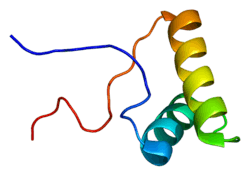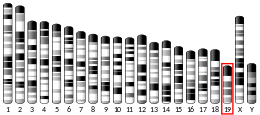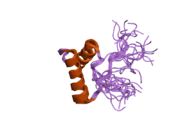SF3B2
Splicing factor 3B subunit 2 is a protein that in humans is encoded by the SF3B2 gene.[5][6]
Function
This gene encodes subunit 2 of the splicing factor 3b protein complex. Splicing factor 3b, together with splicing factor 3a and a 12S RNA unit, forms the U2 small nuclear ribonucleoproteins complex (U2 snRNP). The splicing factor 3b/3a complex binds pre-mRNA upstream of the intron's branch site in a sequence-independent manner and may anchor the U2 snRNP to the pre-mRNA. Splicing factor 3b is also a component of the minor U12-type spliceosome. Subunit 2 associates with pre-mRNA upstream of the branch site at the anchoring site. Subunit 2 also interacts directly with subunit 4 of the splicing factor 3b complex. Subunit 2 is a highly hydrophilic protein with a proline-rich N-terminus and a glutamate-rich stretch in the C-terminus.[6]
Interactions
SF3B2 has been shown to interact with SF3B4,[7][8] RBM7,[9] SF3B1[10][11] and CDC5L.[12]
References
- 1 2 3 GRCh38: Ensembl release 89: ENSG00000087365 - Ensembl, May 2017
- 1 2 3 GRCm38: Ensembl release 89: ENSMUSG00000024853 - Ensembl, May 2017
- ↑ "Human PubMed Reference:".
- ↑ "Mouse PubMed Reference:".
- ↑ Gozani O, Feld R, Reed R (Jan 1996). "Evidence that sequence-independent binding of highly conserved U2 snRNP proteins upstream of the branch site is required for assembly of spliceosomal complex A". Genes & Development. 10 (2): 233–43. PMID 8566756. doi:10.1101/gad.10.2.233.
- 1 2 "Entrez Gene: SF3B2 splicing factor 3b, subunit 2, 145kDa".
- ↑ Rual JF, Venkatesan K, Hao T, Hirozane-Kishikawa T, Dricot A, Li N, Berriz GF, Gibbons FD, Dreze M, Ayivi-Guedehoussou N, Klitgord N, Simon C, Boxem M, Milstein S, Rosenberg J, Goldberg DS, Zhang LV, Wong SL, Franklin G, Li S, Albala JS, Lim J, Fraughton C, Llamosas E, Cevik S, Bex C, Lamesch P, Sikorski RS, Vandenhaute J, Zoghbi HY, Smolyar A, Bosak S, Sequerra R, Doucette-Stamm L, Cusick ME, Hill DE, Roth FP, Vidal M (Oct 2005). "Towards a proteome-scale map of the human protein-protein interaction network". Nature. 437 (7062): 1173–8. PMID 16189514. doi:10.1038/nature04209.
- ↑ Champion-Arnaud P, Reed R (Aug 1994). "The prespliceosome components SAP 49 and SAP 145 interact in a complex implicated in tethering U2 snRNP to the branch site". Genes & Development. 8 (16): 1974–83. PMID 7958871. doi:10.1101/gad.8.16.1974.
- ↑ Guo TB, Boros LG, Chan KC, Hikim AP, Hudson AP, Swerdloff RS, Mitchell AP, Salameh WA (2003). "Spermatogenetic expression of RNA-binding motif protein 7, a protein that interacts with splicing factors". Journal of Andrology. 24 (2): 204–14. PMID 12634307. doi:10.1002/j.1939-4640.2003.tb02664.x.
- ↑ Das BK, Xia L, Palandjian L, Gozani O, Chyung Y, Reed R (Oct 1999). "Characterization of a protein complex containing spliceosomal proteins SAPs 49, 130, 145, and 155". Molecular and Cellular Biology. 19 (10): 6796–802. PMC 84676
 . PMID 10490618. doi:10.1128/mcb.19.10.6796.
. PMID 10490618. doi:10.1128/mcb.19.10.6796. - ↑ Will CL, Urlaub H, Achsel T, Gentzel M, Wilm M, Lührmann R (Sep 2002). "Characterization of novel SF3b and 17S U2 snRNP proteins, including a human Prp5p homologue and an SF3b DEAD-box protein". The EMBO Journal. 21 (18): 4978–88. PMC 126279
 . PMID 12234937. doi:10.1093/emboj/cdf480.
. PMID 12234937. doi:10.1093/emboj/cdf480. - ↑ Ajuh P, Kuster B, Panov K, Zomerdijk JC, Mann M, Lamond AI (Dec 2000). "Functional analysis of the human CDC5L complex and identification of its components by mass spectrometry". The EMBO Journal. 19 (23): 6569–81. PMC 305846
 . PMID 11101529. doi:10.1093/emboj/19.23.6569.
. PMID 11101529. doi:10.1093/emboj/19.23.6569.
Further reading
- Agell N, Aligué R, Alemany V, Castro A, Jaime M, Pujol MJ, Rius E, Serratosa J, Taulés M, Bachs O (1998). "New nuclear functions for calmodulin". Cell Calcium. 23 (2-3): 115–21. PMID 9601606. doi:10.1016/S0143-4160(98)90109-9.
- Champion-Arnaud P, Reed R (Aug 1994). "The prespliceosome components SAP 49 and SAP 145 interact in a complex implicated in tethering U2 snRNP to the branch site". Genes & Development. 8 (16): 1974–83. PMID 7958871. doi:10.1101/gad.8.16.1974.
- Neubauer G, King A, Rappsilber J, Calvio C, Watson M, Ajuh P, Sleeman J, Lamond A, Mann M (Sep 1998). "Mass spectrometry and EST-database searching allows characterization of the multi-protein spliceosome complex". Nature Genetics. 20 (1): 46–50. PMID 9731529. doi:10.1038/1700.
- Das BK, Xia L, Palandjian L, Gozani O, Chyung Y, Reed R (Oct 1999). "Characterization of a protein complex containing spliceosomal proteins SAPs 49, 130, 145, and 155". Molecular and Cellular Biology. 19 (10): 6796–802. PMC 84676
 . PMID 10490618. doi:10.1128/mcb.19.10.6796.
. PMID 10490618. doi:10.1128/mcb.19.10.6796. - Das R, Zhou Z, Reed R (May 2000). "Functional association of U2 snRNP with the ATP-independent spliceosomal complex E". Molecular Cell. 5 (5): 779–87. PMID 10882114. doi:10.1016/S1097-2765(00)80318-4.
- Bryant HE, Wadd SE, Lamond AI, Silverstein SJ, Clements JB (May 2001). "Herpes simplex virus IE63 (ICP27) protein interacts with spliceosome-associated protein 145 and inhibits splicing prior to the first catalytic step". Journal of Virology. 75 (9): 4376–85. PMC 114182
 . PMID 11287586. doi:10.1128/JVI.75.9.4376-4385.2001.
. PMID 11287586. doi:10.1128/JVI.75.9.4376-4385.2001. - Brand M, Moggs JG, Oulad-Abdelghani M, Lejeune F, Dilworth FJ, Stevenin J, Almouzni G, Tora L (Jun 2001). "UV-damaged DNA-binding protein in the TFTC complex links DNA damage recognition to nucleosome acetylation". The EMBO Journal. 20 (12): 3187–96. PMC 150203
 . PMID 11406595. doi:10.1093/emboj/20.12.3187.
. PMID 11406595. doi:10.1093/emboj/20.12.3187. - Will CL, Schneider C, MacMillan AM, Katopodis NF, Neubauer G, Wilm M, Lührmann R, Query CC (Aug 2001). "A novel U2 and U11/U12 snRNP protein that associates with the pre-mRNA branch site". The EMBO Journal. 20 (16): 4536–46. PMC 125580
 . PMID 11500380. doi:10.1093/emboj/20.16.4536.
. PMID 11500380. doi:10.1093/emboj/20.16.4536. - Jurica MS, Licklider LJ, Gygi SR, Grigorieff N, Moore MJ (Apr 2002). "Purification and characterization of native spliceosomes suitable for three-dimensional structural analysis". RNA. 8 (4): 426–39. PMC 1370266
 . PMID 11991638. doi:10.1017/S1355838202021088.
. PMID 11991638. doi:10.1017/S1355838202021088. - Will CL, Urlaub H, Achsel T, Gentzel M, Wilm M, Lührmann R (Sep 2002). "Characterization of novel SF3b and 17S U2 snRNP proteins, including a human Prp5p homologue and an SF3b DEAD-box protein". The EMBO Journal. 21 (18): 4978–88. PMC 126279
 . PMID 12234937. doi:10.1093/emboj/cdf480.
. PMID 12234937. doi:10.1093/emboj/cdf480. - Warner DR, Roberts EA, Greene RM, Pisano MM (Dec 2003). "Identification of novel Smad binding proteins". Biochemical and Biophysical Research Communications. 312 (4): 1185–90. PMID 14651998. doi:10.1016/j.bbrc.2003.11.049.
- Will CL, Schneider C, Hossbach M, Urlaub H, Rauhut R, Elbashir S, Tuschl T, Lührmann R (Jun 2004). "The human 18S U11/U12 snRNP contains a set of novel proteins not found in the U2-dependent spliceosome". RNA. 10 (6): 929–41. PMC 1370585
 . PMID 15146077. doi:10.1261/rna.7320604.
. PMID 15146077. doi:10.1261/rna.7320604. - Beausoleil SA, Jedrychowski M, Schwartz D, Elias JE, Villén J, Li J, Cohn MA, Cantley LC, Gygi SP (Aug 2004). "Large-scale characterization of HeLa cell nuclear phosphoproteins". Proceedings of the National Academy of Sciences of the United States of America. 101 (33): 12130–5. PMC 514446
 . PMID 15302935. doi:10.1073/pnas.0404720101.
. PMID 15302935. doi:10.1073/pnas.0404720101. - Lin KT, Lu RM, Tarn WY (Oct 2004). "The WW domain-containing proteins interact with the early spliceosome and participate in pre-mRNA splicing in vivo". Molecular and Cellular Biology. 24 (20): 9176–85. PMC 517884
 . PMID 15456888. doi:10.1128/MCB.24.20.9176-9185.2004.
. PMID 15456888. doi:10.1128/MCB.24.20.9176-9185.2004. - Andersen JS, Lam YW, Leung AK, Ong SE, Lyon CE, Lamond AI, Mann M (Jan 2005). "Nucleolar proteome dynamics". Nature. 433 (7021): 77–83. PMID 15635413. doi:10.1038/nature03207.
- Rual JF, Venkatesan K, Hao T, Hirozane-Kishikawa T, Dricot A, Li N, Berriz GF, Gibbons FD, Dreze M, Ayivi-Guedehoussou N, Klitgord N, Simon C, Boxem M, Milstein S, Rosenberg J, Goldberg DS, Zhang LV, Wong SL, Franklin G, Li S, Albala JS, Lim J, Fraughton C, Llamosas E, Cevik S, Bex C, Lamesch P, Sikorski RS, Vandenhaute J, Zoghbi HY, Smolyar A, Bosak S, Sequerra R, Doucette-Stamm L, Cusick ME, Hill DE, Roth FP, Vidal M (Oct 2005). "Towards a proteome-scale map of the human protein-protein interaction network". Nature. 437 (7062): 1173–8. PMID 16189514. doi:10.1038/nature04209.
- Ardon O, Zimmerman ES, Andersen JL, DeHart JL, Blackett J, Planelles V (Apr 2006). "Induction of G2 arrest and binding to cyclophilin A are independent phenotypes of human immunodeficiency virus type 1 Vpr". Journal of Virology. 80 (8): 3694–700. PMC 1440437
 . PMID 16571786. doi:10.1128/JVI.80.8.3694-3700.2006.
. PMID 16571786. doi:10.1128/JVI.80.8.3694-3700.2006.





